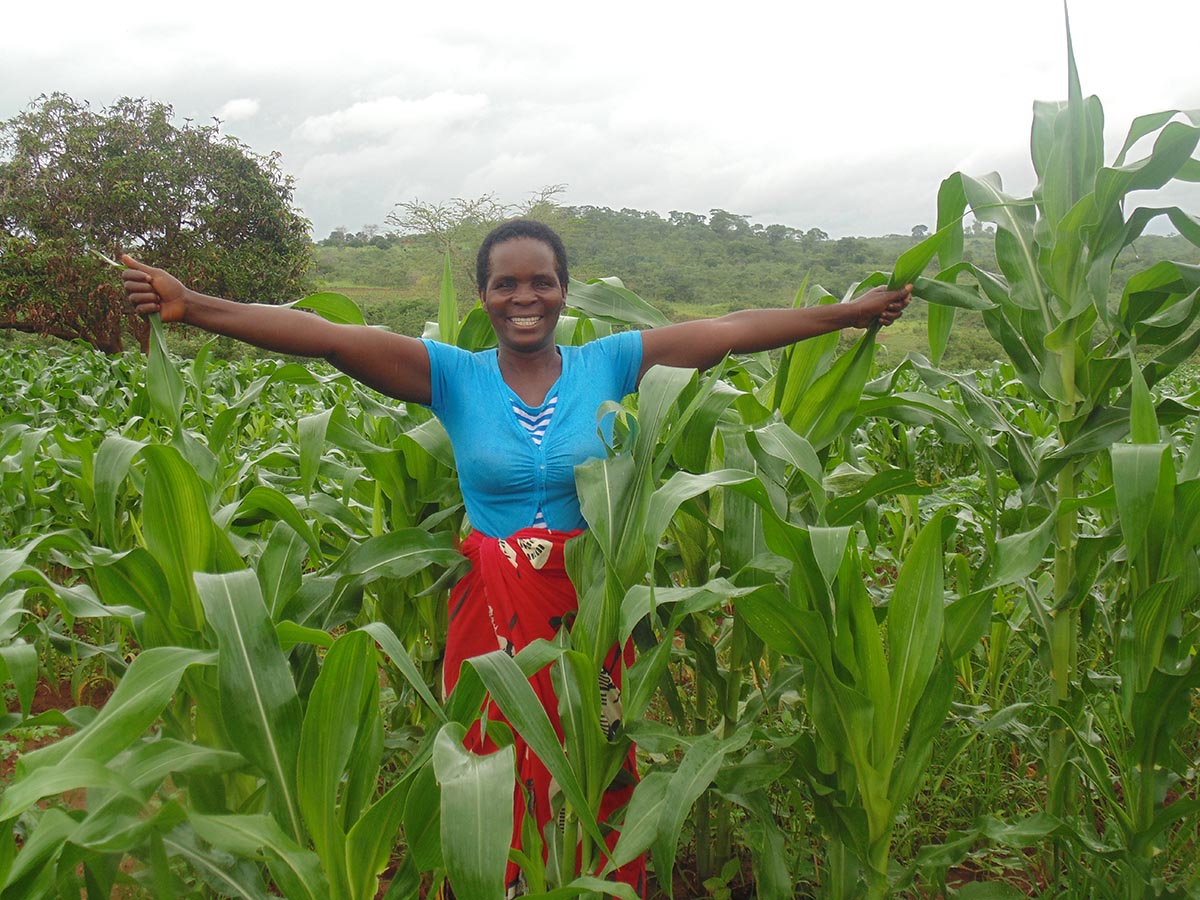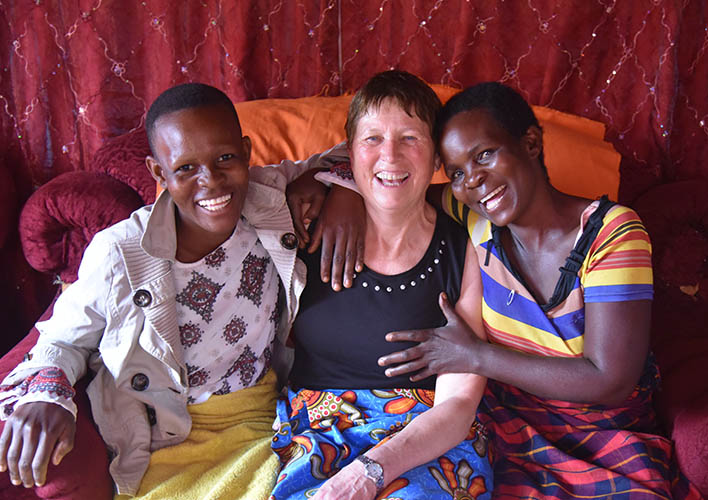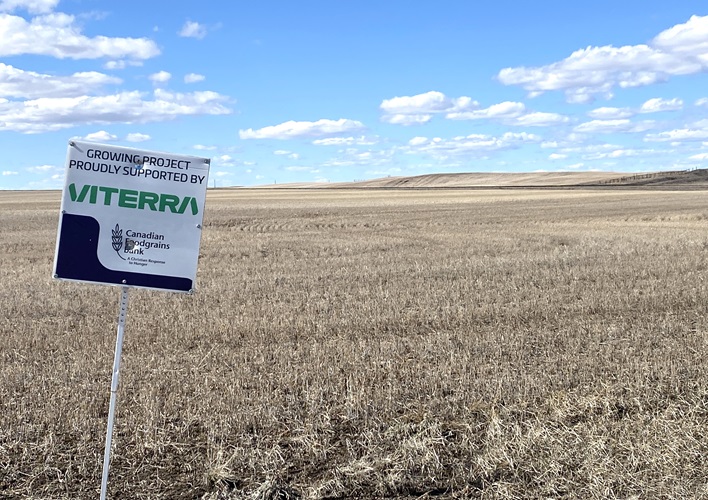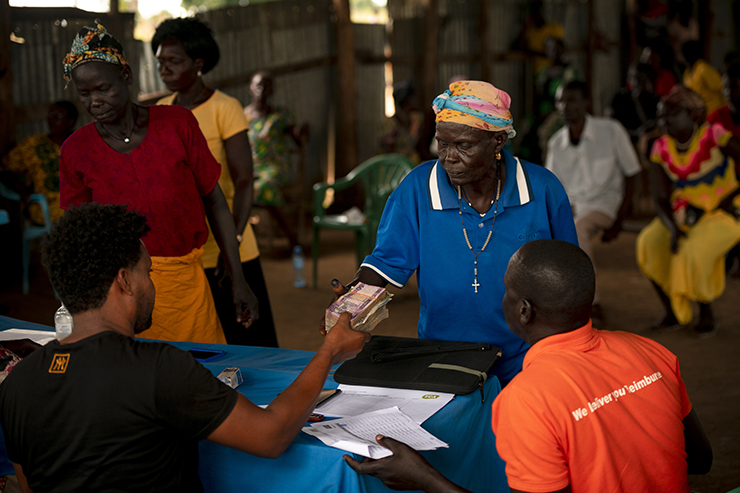Debora Kantor (middle) with Olient Nyasulu (right) and their translator Flyness Banda (left) in Olient’s home in the Kabanda community in Malawi. (Photo: Shaylyn McMahon)
Debora Kantor is from Cambridge-Narrows, New Brunswick. She is a member of the Parish of Cambridge & Waterborough.
Olient Nyasulu is a Malawian woman from the community of Kabanda.
They come from two very different worlds and life experiences.
However, not only do they both share a love of tending the land and a strong Christian faith—they’re also connected through Canadian Foodgrains Bank.
Kantor travelled to Malawi in early February as part of a Foodgrains Bank learning tour, where she learned about the effects that climate change has on hunger in the country.
As part of the tour, Kantor stayed in Nyasulu’s home for three nights. She learned about some of the challenges Nyasulu faces, and how Nyasulu is working hard to meet those challenges head-on.
Eighty per cent of people in Malawi rely on the land to grow food for themselves and their families.
“One of Nyasulu’s greatest joys in life was having enough food to feed her family,” says Kantor. “Through the project, she learned to increase her yields by making compost to help fertilize her soil.”
“Eighty per cent of people in Malawi rely on the land to grow food for themselves and their families,” she explains, noting that for Malawians like Nyasulu, there’s a fine margin between having enough food to eat and not.
Subtle changes in the weather can make a big difference in the ability of small-scale farmers to earn a livelihood.
“Over the course of the trip, we heard from farmer after farmer how they were struggling with prolonged dry spells, or how their crops wouldn’t grow because their soil wasn’t fertile,” says Kantor.
Although Kantor isn’t a farmer, she does love to garden, and the challenge of being disappointed by poor weather was one she could relate to.

Olient Nyasulu shows off the maize she grew using farming techniques she learned through Foodgrains Bank member Presbyterian World Service & Development. (Photo: Debora Kantor)
Nyasulu also learned new food production techniques to increase the nutrients in her children’s diets. One technique she learned was to cook peanut flour with vegetables to increase the protein in meals.
“I said to Nyasulu, ‘Your children look healthy,’ and she said ‘Yes – because of the nutrition training,’” says Kantor.
Ultimately, Kantor believes it was her Christian faith that helped her create meaningful connections with Nyasulu and her family.
“I had a heart-to-heart connection with them,” she says. “We were truly all brothers and sisters in Christ, and of all the places I’ve travelled, I feel most connected to Nyasulu and her community.”
Kantor’s faith is also a reason she believes Canadians should do what they can to help people overseas experiencing hunger.
“We have been blessed in our country with adequate food,” she says. “And God calls on us to support all his children – all his brothers and sisters – around the world.”
As an Anglican looking to reach out to people experiencing hunger around the world, Kantor hopes to bring together her parish with other local churches to start a growing project in support of responding to hunger through the Primate’s World Relief and Development Fund’s account at the Foodgrains Bank.
Growing projects are a really great, direct way to come together in support of world hunger.
Through growing projects, a group of people come together to plant, tend and harvest a crop, and then donate the proceeds to be used in the working of ending world hunger.
“Canadian Foodgrains Bank connects farmers with churches to provide food for people in need,” says Kantor. “And the Foodgrains Bank works with partners who are on the ground and who know the local needs intimately – that was made very evident to me in Malawi.”
“So growing projects are a really great, direct way to come together in support of world hunger,” she says.
To learn more about Kantor’s experience or get involved in her efforts to help end global hunger, contact her at deb.a.kantor@gmail.com.
– Shaylyn McMahon, Communications Assistant




